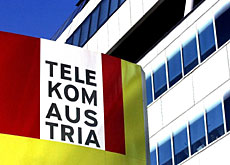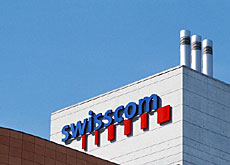Swisscom hangs up on Telekom Austria merger

Swisscom and Telekom Austria (TA) have ditched a politically controversial takeover that would have created the fifth-largest telecoms operator in Europe.
Switzerland’s main telecoms company announced on Thursday that talks on a possible merger had ended without agreement.
The announcement ended almost 18 months of on-off merger talks between the two state-controlled neighbours.
Swisscom chief executive Jens Alder said he saw no opportunity for the company to make a deal with TA in the foreseeable future. He added that there were no other substantial acquisitions on the horizon.
“This is the end of the Swisscom/Telekom Austria saga,” he said.
Austria’s state privatisation agency OeIAG, which controls TA, said both sides had been close to hammering out the final details of a deal.
OeIAG head Peter Michael blamed a lack of support in Austria for the failure of drawn-out talks.
“We were forced to recognise that at the decisive moment we did not have the support we thought we had,” he said.
Austrian opposition
Austrian finance minister Karl-Heinz Grasser welcomed the collapse of a deal which he said would not have protected Austria’s interests.
Takeover talk had triggered a political row amid concerns about Austrian job cuts and the loss of a major blue-chip company.
Shares in TA plunged more than 18 per cent on the news; Swisscom’s share price remained unchanged at SFr409.
Swisscom said both sides could see the advantages of a €3.25 billion (SFr5 billion) deal in which the Swiss group would have paid cash and 11 percent of its own stock to buy a 42 per cent stake in TA.
A merger would have valued Austria’s top telecoms operator at about €7.5 billion.
Faced with limited growth opportunities at home, cash-rich Swisscom had been eyeing the Austrian operator for some time.
But political hurdles and differing price demands overshadowed the talks, which hit a deadlock last year.
History of failed mergers
The Swiss operator has a ten-year history of failed mergers and takeover bids. The company saw its first-half net income plummet by 20 per cent this year after selling at a loss its 95 per cent stake in the German mobile-phone operator, debitel.
Earlier failed ventures, which cost hundreds of millions of francs, include alliances in Austria in 1998, India and Malaysia in 1996, and the Czech Republic in 1995.
Some analysts said they were not surprised at the failure of the latest deal, which valued TA shares at about €15.5 per share.
“I have never been a big believer in this deal,” said one analyst. “The value creation would not have been that great at the price discussed.”
Unusual deal
In an effort to placate political opposition, the OeIAG had hoped to ensure that TA would remain an independent unit, retaining its brand name and a listing on the Vienna bourse.
The agency also wanted the Austrian government to have special voting powers on the 11 per cent Swisscom stake it received.
“The deal was very unusual,” said a London-based analyst. “[The structure] made it difficult for Swisscom to accept it.”
Experts noted the difficulties of forging a cross-border telecoms merger in Europe, which is littered with failed takeover attempts between former state monopolies.
Swiss Finance Minister Hans-Rudolf Merz told the “Tages-Anzeiger” newspaper on Friday that it was in the government’s interest to give up its majority in Swisscom.
He said it made little sense for the state to control a company active in a competitive market.
“The political world acts too slowly, whereas in business you need to take quick decisions. Swisscom represents a sizeable risk for the state,” he told the paper.
swissinfo, Elizabeth Meen
Swisscom was looking for a 42% stake in Telekom Austria.
It offered 11% of its own stock and SFr1.5 billion.
The Swiss government holds 62.7% of Swisscom.
Some failures of Swisscom abroad:
1995 – invests more than SFr800 million in a Czech operator and later sells off its stake for SFr600 million.
1996 – invests SFr250 million in India and SFr390 million in Malaysia. Later pulls out, costing SFr520 million.
1998 – buys half of Austria’s UTA but later pulls out, at a loss of SFr430 million.
1999 – invests billions in German operator debitel. In March, it sells at a loss of SFr2 billion.

In compliance with the JTI standards
More: SWI swissinfo.ch certified by the Journalism Trust Initiative










You can find an overview of ongoing debates with our journalists here . Please join us!
If you want to start a conversation about a topic raised in this article or want to report factual errors, email us at english@swissinfo.ch.